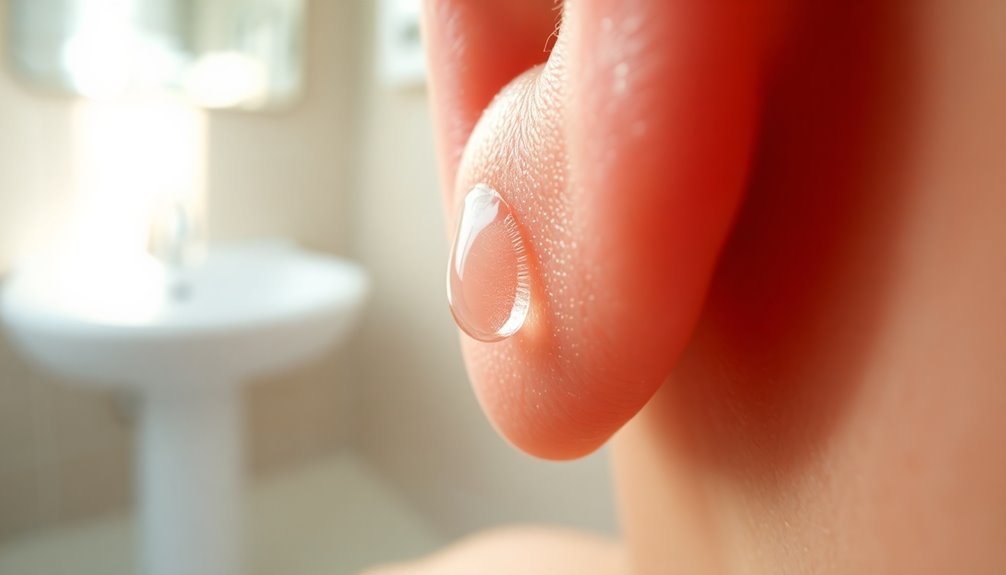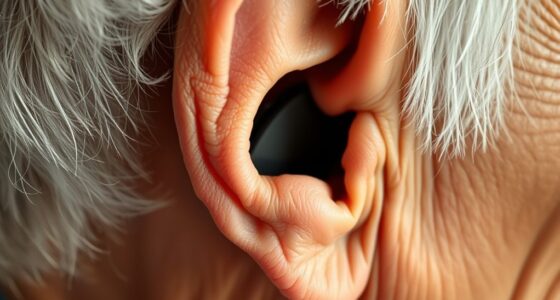If your ear smells inside, it might be due to poor hygiene, infections, or skin conditions. Bacteria can thrive in moist environments, leading to unpleasant odors, especially if dirt and earwax accumulate. Infections like swimmer's ear or conditions such as eczema can also produce foul-smelling discharge. Environmental factors, like humidity and wearing masks, can worsen the problem. To combat this odor, maintain proper hygiene, keep your ears dry, and consider using antibacterial products. If the smell persists or you notice other troubling symptoms, it might be time to consult a healthcare professional for further insight.
Key Takeaways
- Poor hygiene can lead to ear odors by allowing dirt, oils, and earwax to accumulate inside the ear.
- Infections like swimmer's ear or otitis media can produce foul-smelling discharge and require medical evaluation.
- Skin conditions such as seborrheic dermatitis may cause flaky patches, contributing to unpleasant smells in the ear area.
- Environmental factors, including humidity and trapped moisture from masks, can exacerbate ear odor by promoting bacterial growth.
- Persistent ear odor or unusual discharge should prompt a consultation with a healthcare professional for proper diagnosis and treatment.
Poor Hygiene and Secretions
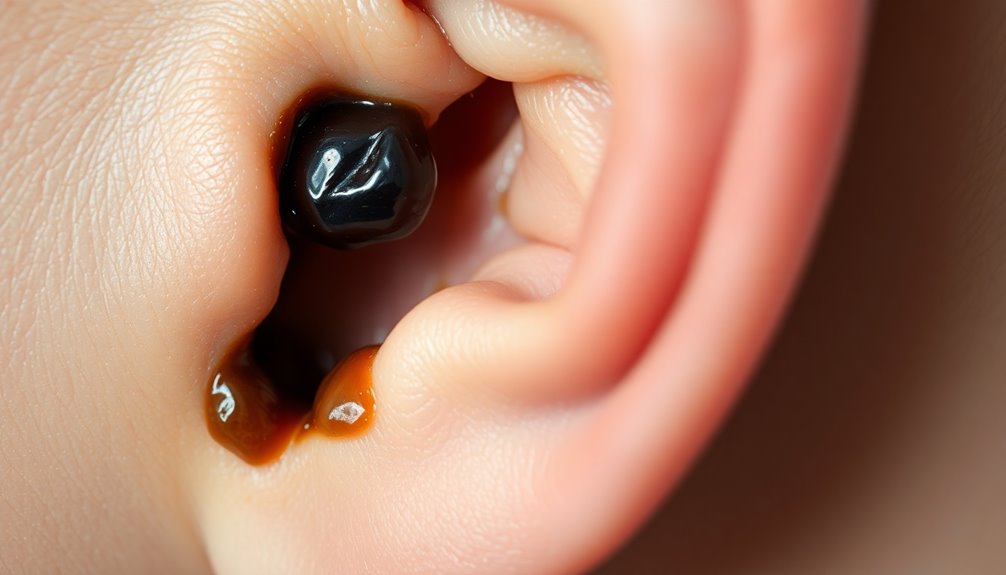
Neglecting to maintain proper hygiene can lead to unpleasant odors from your ears. If you don't wash behind your ears regularly, dirt and oils can accumulate, contributing to those unwanted smells. Infrequent cleaning of the ear canal allows earwax to build up, which can trap bacteria and produce foul odors. Normal earwax may not smell bad, but it can become odorous when it gets wet or accumulates excessively. Additionally, ear infections can also contribute to foul smells due to the presence of bacteria and discharge.
You should also pay attention to the outer ear and earlobe. If you neglect these areas, skin irritation can arise, exacerbating the odor problem. Conditions like seborrheic dermatitis can lead to flaky, scaly skin that smells unpleasant, especially if fungi are present. Moreover, if you don't regularly check for irritation or signs of infection, you might let the issue worsen.
To prevent these odors, make it a habit to clean your ears properly. Use soap and water to keep the area fresh and free of buildup. Regular hygiene practices can make a huge difference in avoiding unpleasant smells and maintaining overall ear health.
Infections Causing Odor
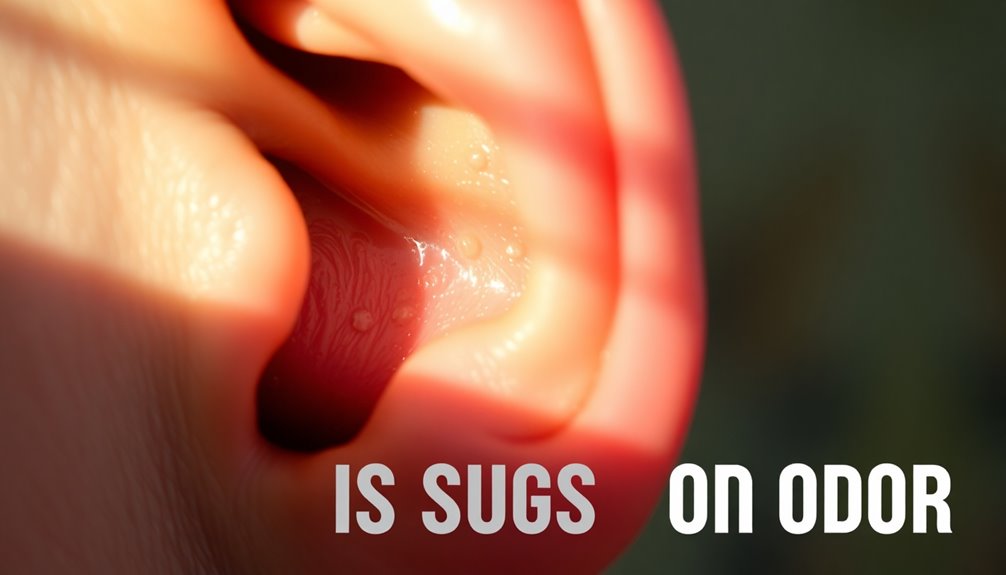
Experiencing ear infections can lead to unpleasant odors emanating from your ears, often due to the buildup of foul-smelling discharge. Bacteria, viruses, or fungi can infect your middle or inner ear, causing this odor. If you have a middle ear infection, known as otitis media, you might notice yellow or white discharge, along with pain, hearing loss, and fever. Inner ear infections, or otitis interna, can also produce a foul smell and are often accompanied by inflammation.
Outer ear infections, like swimmer's ear (otitis externa), can result from swimming in unclean water or using cotton swabs, leading to irritation and foul-smelling discharge. Symptoms may include redness, warmth, pain, and shedding skin in the ear canal. Excessive secretions can contribute significantly to the unpleasant odor associated with these infections, as they create an ideal environment for bacterial growth.
Cholesteatoma, an abnormal growth of skin cells behind the eardrum, often arises from chronic infections, causing a smelly discharge and hearing loss. Lastly, if an ear infection spreads to the mastoid bone, it can result in mastoiditis, marked by pain, fever, and yellow discharge. Treatment for these infections typically involves medications, and in severe cases, surgical intervention may be necessary to eliminate the source of the odor.
Impact of Physical Barriers
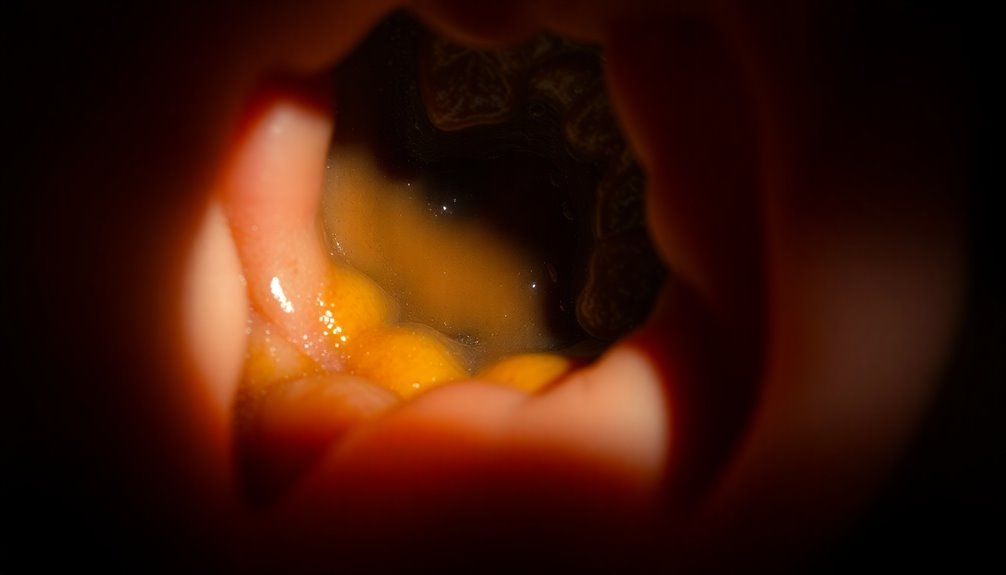
Physical barriers can significantly contribute to ear odor issues, especially when they prevent proper ventilation and cleaning. For instance, long hair can trap sweat, dirt, and hair products, leading to unpleasant smells behind your ears. Additionally, wearing scarves, earmuffs, or hats can exacerbate this problem by keeping moisture and debris close to your skin. These barriers restrict airflow, which is essential for maintaining a fresh environment. Excessive earwax accumulation can lead to odor due to trapped bacteria and dirt, further complicating the situation.
Foreign objects, like insects or food particles, can also become lodged in your ear, leading to odor and discomfort. When debris accumulates, it can cause infections and even hearing loss. Using cotton swabs may push wax deeper, causing further blockage and odor.
Moreover, personal care items like hair sprays and cosmetics can introduce irritants that contribute to the smell. If allergens transfer from your fingers to your ears, they can cause reactions that lead to unpleasant scents.
Finally, environmental factors, such as humidity and pollution, can create additional challenges. When moisture accumulates, it fosters bacterial growth, further complicating your ear health. By addressing these physical barriers, you can significantly reduce ear odor issues.
Skin Conditions and Odor
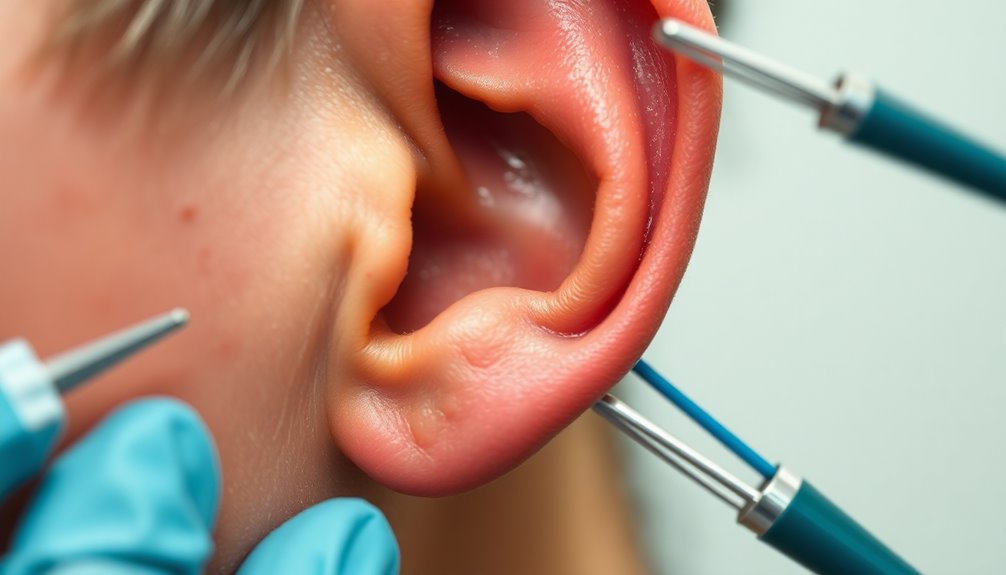
Dealing with skin conditions like seborrheic dermatitis, atopic eczema, contact dermatitis, and otitis externa can lead to unpleasant odors emanating from your ears. Seborrheic dermatitis often affects the skin behind your ears and can result in flaky, scaly, and oily patches that trap sweat and odor. This condition is triggered by an over-reaction to the yeast *malassezia*, and antifungal treatments can help clear the symptoms. Yeast infections may also develop in warm, moist areas, compounding the odor issue.
Atopic eczema typically impacts the ears as well, causing dry, itchy skin that's prone to infection if scratched. This damaged skin barrier can worsen odor issues, especially if it becomes infected.
Contact dermatitis, which can stem from irritants like shampoos or perfumes, leads to red, itchy skin around your ears. Avoiding these allergens is key to preventing this condition.
While these skin issues can create odors, addressing them through proper treatments and preventative measures can help keep your ears smelling fresh. Make sure to consult a healthcare professional for appropriate solutions tailored to your specific condition.
Middle and Outer Ear Issues
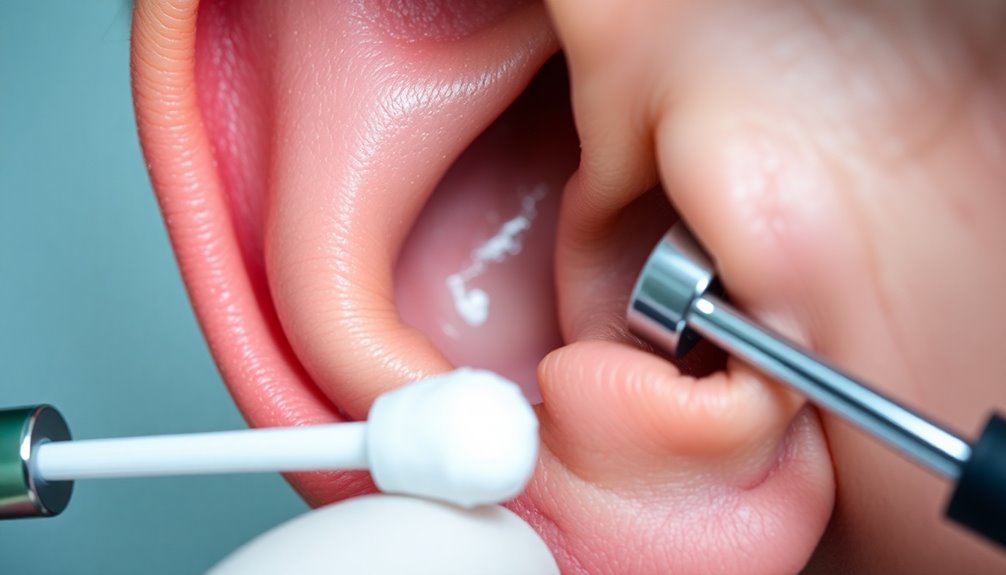
Middle and outer ear issues can lead to significant discomfort and even unpleasant odors. One common problem is middle ear infections, known as otitis media, which can cause fluid buildup and pressure behind your eardrum. This might result in ear pain, difficulty hearing, and even discharge that can smell foul. If you have a cholesteatoma, an abnormal growth in the middle ear, it can also lead to a bad-smelling fluid leaking from your ear.
Outer ear infections, or otitis externa, can occur from bacterial or fungal infections, especially after prolonged water exposure. These infections often cause a smelly discharge along with symptoms like redness and itching. If you've inserted foreign objects into your ear, this can lead to infections and a bad smell as well. Weakened immune systems can increase susceptibility to otomycosis, making it essential to be vigilant about ear hygiene and health.
In severe cases, conditions like malignant otitis externa can develop, particularly in individuals with weakened immune systems, causing a particularly foul odor. Remember, if you're experiencing ear pain or unusual smells, it's crucial to consult a healthcare provider to address these issues before they escalate.
Prevention and Treatment Options
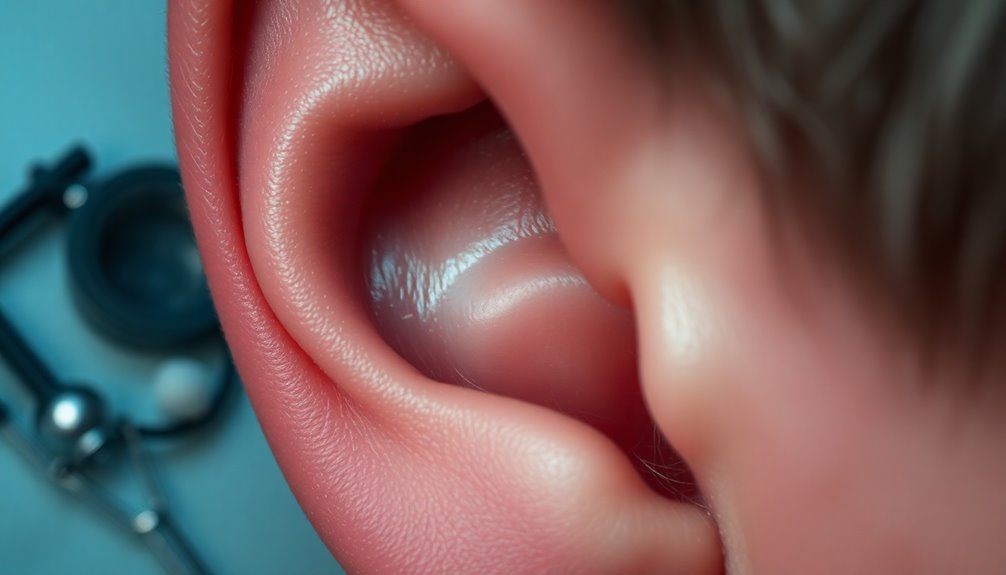
Ear odor can often stem from infections or other issues in the middle and outer ear, making it important to adopt effective prevention and treatment strategies. Start by maintaining proper hygiene. Clean the area behind your ears regularly with a mild soap or gentle cleanser, using a soft cloth or cotton ball to avoid irritation. After cleaning, ensure the area is thoroughly dried to prevent moisture buildup.
Disinfect the skin behind your ears with an alcohol-free antiseptic solution. If you have piercings, apply rubbing alcohol or hydrogen peroxide afterwards. Regularly clean earrings to prevent bacterial growth. You might also try essential oils like tea tree or lavender for their antibacterial properties. Additionally, increased mask usage can trap moisture and friction, promoting bacterial growth and odor, so be mindful of how often you wear masks.
To minimize sweat, keep the area cool and dry. Use baby powder or antiperspirant and choose breathable fabrics. After exercising or spending time in heat, wipe the area with a damp cloth. If dandruff or scalp issues contribute to the smell, consider medicated shampoo. Lastly, clean face masks regularly to avoid skin issues from trapped moisture. By following these steps, you can effectively prevent and treat ear odor.
Frequently Asked Questions
Can Diet Affect the Smell of My Ears?
Yes, your diet can definitely affect the smell of your ears. Certain foods, like dairy and gluten, might increase ear wax production, leading to odor. Spicy foods and alcohol can also stimulate wax buildup. On the flip side, eating fruits, vegetables, and omega-3 rich foods can support ear health. Staying hydrated is key too, as it helps maintain a healthy balance of ear wax. So, watch what you eat for better ear health!
Is Ear Odor Linked to Allergies or Sensitivities?
Yes, ear odor can be linked to allergies or sensitivities. When you experience allergic reactions, inflammation in your nasal passages and Eustachian tubes can occur, leading to fluid buildup in the middle ear. This creates an environment ripe for infections, which often produce unpleasant smells. Additionally, food allergies can trigger mucus production, further contributing to the issue. Managing your allergies effectively can help reduce ear odor and the risk of infections.
Should I See a Doctor for Ear Odor?
If you notice an unusual odor coming from your ear, it's best to see a doctor. This could indicate an infection, excessive earwax, or even a foreign object. You should pay attention to other symptoms like pain, discharge, or hearing loss. Don't wait too long; getting a professional opinion can help prevent further complications. Trust your instincts—if something feels off, it's always better to be safe and seek medical advice.
Can Stress Contribute to Ear Odor Issues?
Yes, stress can contribute to ear odor issues. When you're stressed, your body may produce more earwax, which can lead to blockages. These blockages can trap bacteria and dirt, causing unpleasant smells. Stress may also make you more susceptible to ear infections, which can further exacerbate odor problems. By managing your stress through relaxation techniques and regular breaks, you can help maintain better ear health and reduce the chances of odor.
How Often Should I Clean Behind My Ears?
You should clean behind your ears daily, especially during your showers or baths. This area tends to accumulate sweat, dirt, and dead skin, which can lead to unpleasant odors and potential infections. After intense physical activity, it's a good idea to give it a quick wipe with a warm, wet washcloth. Exfoliating once or twice a week can also help prevent buildup, keeping your skin fresh and healthy.
Conclusion
In conclusion, if your ear smells, it could be due to poor hygiene, infections, or skin conditions. Don't ignore the signs, as these odors can indicate underlying health issues. Regular cleaning and proper ear care are essential to prevent unpleasant smells. If the odor persists, it's best to consult a doctor for a proper diagnosis and treatment. Your ears deserve attention, so take action to keep them healthy and odor-free!


